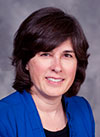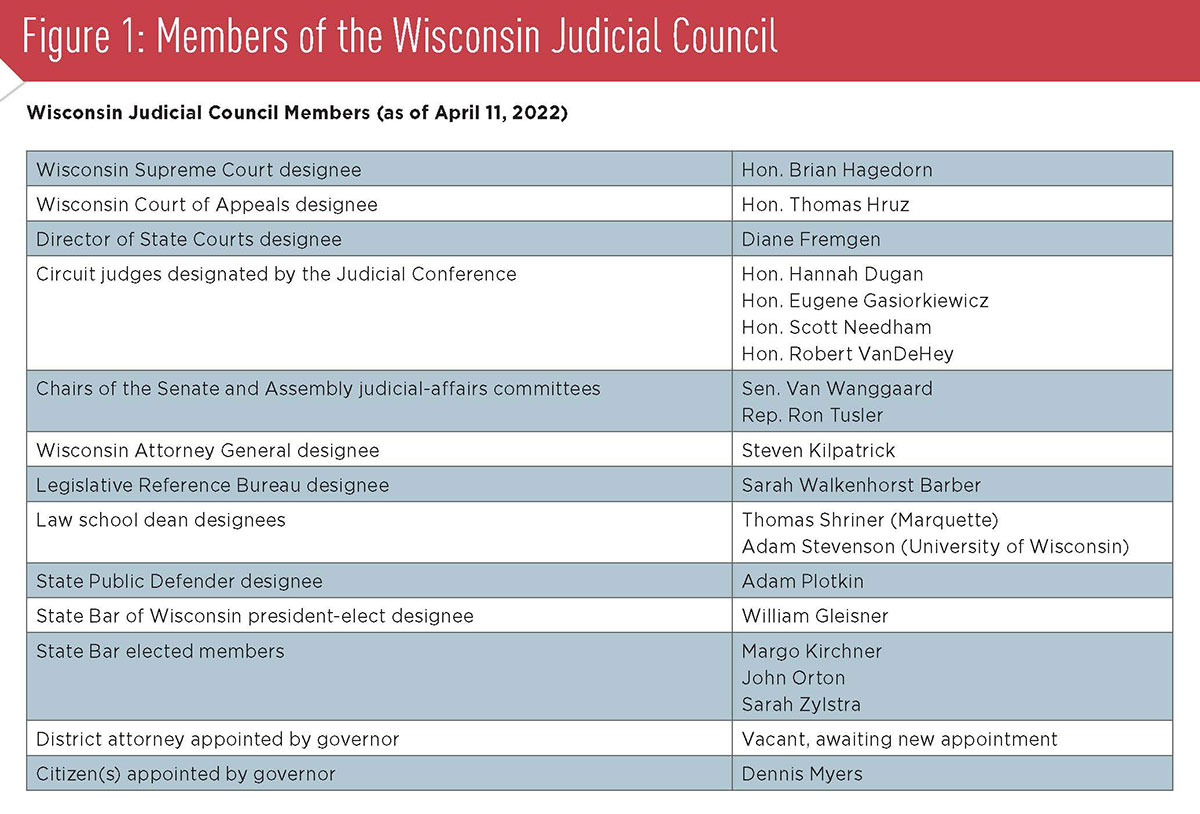
Have you ever wondered why a particular civil procedure rule exists (especially one you don’t like) or had an idea about improving pretrial or trial practice? If so, have you simply followed the rule and moved on? Next time, don’t stop right there. Pass your idea on to the Wisconsin Judicial Council – a state governmental body that studies and develops the rules of procedure. Wisconsin lawyers can influence operation of state courts by voting for or being a member of the Judicial Council, submitting suggestions to the council, and supporting the council’s continued funding.
Duties and Members
The Judicial Council is a nonpartisan governmental body created by Wis. Stat. section 758.13 in 1951. The Judicial Council is charged with the following:
observing and studying the rules of pleading, practice, and procedure in the state courts and advising the Wisconsin Supreme Court of changes to “simplify procedure and promote a speedy determination of litigation upon its merits”;
studying the organization, jurisdiction, and methods of administration and operation in the state courts;
considering, investigating in its discretion, and making recommendations arising from suggestions from any source regarding the administration of justice;
keeping advised of court decisions relating to practice and procedure and pending legislation affecting various aspects of the courts;
recommending to the legislature changes in the organization, jurisdiction, operation, and methods of conducting the business of the courts, including statutes governing pleading, practice, and procedure; and
recommending to the supreme court, legislature, or governor changes in the organization, operation, or methods of conducting the business of the courts “that will improve the efficiency and effectiveness of the court system and result in cost savings.”1
By statute, the council consists of 21 members from the three branches of state government, academia, private practice, and the public.2 A 2007 report on the Judicial Council remarked that “[t]he strength of the Judicial Council … is its independence, and the diversity and expertise of its membership.”3
 Margo S. Kirchner, Michigan 1991, is the executive director of the Wisconsin Justice Initiative, a nonprofit organization improving Wisconsin’s justice system through advocacy and education, and the elected municipal judge for the Village of Shorewood. She is one of four State Bar of Wisconsin representatives to the Wisconsin Judicial Council.
Margo S. Kirchner, Michigan 1991, is the executive director of the Wisconsin Justice Initiative, a nonprofit organization improving Wisconsin’s justice system through advocacy and education, and the elected municipal judge for the Village of Shorewood. She is one of four State Bar of Wisconsin representatives to the Wisconsin Judicial Council.
Kirchner is a member of the U.S. Courts’ Electronic Public Access Public User Group and a former president of the Association for Women Lawyers (AWL), and she currently chairs the AWL Foundation board of directors.
Get to know the author: Check out Q&A below.
Representatives from the courts include one Wisconsin Supreme Court justice, one court of appeals judge, four circuit court judges, and the Director of State Courts or the director’s designee. Representatives from the legislative branch include the following or their designees: the chairs of the Senate and Assembly judiciary committees and the chief of the Legislative Reference Bureau. From the executive branch, the governor appoints two citizens at large and one district attorney. The attorney general and the state public defender or their designees also serve.
From academia, the deans of the University of Wisconsin Law School and Marquette University Law School may themselves serve, or they may designate faculty members.
Three State Bar of Wisconsin representatives serve three-year terms on the Judicial Council; one member is elected each year. In addition, the State Bar president-elect may serve or designate a representative who serves a one-year term.4 (See Figure 1 below for the list of current members and their appointing authorities.)
Members receive no compensation for their service, though they are entitled by statute to reimbursement for expenses incurred to attend council meetings.5
State Bar representatives William Gleisner and John Orton have served as the Judicial Council’s chairperson and vice-chairperson, respectively, for the past four years.
Open Meetings and Records
The Judicial Council generally meets eight times per year. Before COVID-19 pandemic shutdowns began in March 2020, the Judicial Council met in person at the state capitol. Currently, the council conducts its regular meetings via Zoom. All meetings are open to the public. Agendas and instructions for joining the Zoom meetings are available through the Wisconsin State Law Library’s website page for the Judicial Council: https://wilawlibrary.gov/judicialcouncil/index.htm.
The Wisconsin State Historical Society and the Wisconsin State Law Library maintain Judicial Council records.

Historical Work Product and Focus
Although some lawyers might not be familiar with the Judicial Council, they likely are familiar with the results of its work. The council drafted Wisconsin’s original rules of civil and criminal procedure, rules of appellate practice, and rules of evidence, and it has generated numerous amendments to the rules since then. According to the 2007 report on the Judicial Council, the council “played a pivotal role in the development of most major rules or rules revisions and in the development of a significant number of legislative enactments affecting court procedure.”6
Often, the council includes explanatory notes that are published with the rules to aid judges and court staff, lawyers, and the public in interpreting and applying the provisions.
While the council in its early years attended to issues of court structure and organization,7 court administration functions were later assigned by the legislature and the supreme court to an administrative director, now the Director of State Courts.8
Thus, notwithstanding the broader mandate that remains in the statute, the Judicial Council now focuses on court practice and procedure. The council reviews the procedural rules; identifies areas requiring improvement due to evolving practices, gaps in the rules, new technology, or other reasons; studies possible solutions; and proposes changes as appropriate.
Changes are presented either as rules petitions to the supreme court or as proposed bills to the legislature, depending on which entity has rule-making authority for the change.
Examples of the Judicial Council’s work over only the past 15 years include the following:
the rule change permitting parties to cite unpublished court of appeals decisions,
legislation tolling the time limit for filing a petition for review in the supreme court while a motion for reconsideration is pending in the court of appeals,
collaboration with the Wisconsin Municipal Judges Association and the legislature regarding comprehensive amendments to the laws governing municipal courts,
recommendations regarding calculation of time for appeal in small claims cases,
new rules governing discovery of electronically stored information,
rules on inadvertent disclosure of privileged information, and
a comprehensive amendment to the class-action statute to align it with Fed. R. Civ. P. 23.9
More recently, the Judicial Council filed successful petitions to extend the availability of default judgment to counterclaims and crossclaims10 and to establish procedures for pro hac vice admission and substitution and withdrawal of retained counsel in appellate proceedings.11
Committees and Current Work
Most of the research and drafting work of the Judicial Council occurs within its three regular committees: the Evidence and Civil Procedure (ECP) Committee (Thomas Shriner, chair), the Appellate Procedure Committee (the Hon. Thomas Hruz, chair), and the Criminal Procedure Committee (the Hon. Robert VanDeHey, chair). Each committee includes members from outside the council who have knowledge pertinent to the committee’s work. As with council meetings, committee meetings are open to the public.
Often, the committees identify possible procedural rules for the Judicial Council to study. However, rule suggestions can come from a variety of sources other than council and committee members. The supreme court or the legislature may refer areas of study to the council, and suggestions might come from lawyers, the State Bar of Wisconsin, law professors, or the public.
Proposed projects are reviewed and approved by the full Judicial Council and then referred to an appropriate committee. The Legislative Reference Bureau typically provides final drafting style and numbering for proposed legislation. The committee tenders its proposed final product back to the full council for approval before filing a rules petition with the supreme court or referring a proposed bill to the legislature.
The ECP Committee is finishing a lengthy project revising Wis. Stat. chapter 813 rules governing temporary restraining orders and preliminary injunctions. In February 2022, the ECP Committee launched its next project: updating the rules of evidence. Professor Daniel Blinka of Marquette University Law School and Professor David Schwartz of the University of Wisconsin Law School will assist the ECP Committee as ad hoc members for the new project.
The Appellate Procedure Committee has been developing rules for competency proceedings under Wis. Stat. section 971.14 for cases on appeal.12 In addition, the committee is looking into informing Wisconsin judges and lawyers about the new appellate e-filing rules.
The Criminal Procedure Committee has been discussing how to adapt court proceedings to remote technologies such as Zoom, especially when the constitutional rights of criminal defendants are implicated, and whether some of the improvements made possible by Zoom and similar technologies should be adopted permanently.13
By statute, the council is entitled to appoint a Wisconsin-licensed staff attorney to assist in its work.14 However, funding for the Judicial Council’s staff attorney was eliminated in the 2018 budget and has not been restored.
Since then, the Judicial Council has continued to meet regularly and work toward its mission, though not at its prior pace. Judicial Council members conduct the body’s research and drafting and present the council’s petitions to the Supreme Court. The council’s chair handles most administrative tasks, with some logistical help from the Wisconsin State Law Library and the office of member Sen. Van Wanggaard. This reliance on the time and efforts of volunteer members with full-time professional responsibilities elsewhere often means that rule-revision projects take longer than they would if paid staff were available.
Future Updates from State Bar Council Representatives
The State Bar selects four of the council’s 21 members. Those State Bar members offer their substantive knowledge to rules projects but also serve as State Bar liaisons to the council. Look for future quarterly reports from the State Bar Judicial Council representatives or the council’s committee chairs to be published in InsideTrack or on WisBar to keep State Bar members informed about the council’s ongoing work. If you would like to suggest possible changes to the rules of practice and procedure that the council or its committees should study, please send them to any of the four State Bar representatives.
Meet Our Contributors
What is the most memorable trip you ever took?
 In 1986, I spent a college semester studying abroad in London. From there a group traveled to the Soviet Union during break, visiting Leningrad and Moscow. I have many memories of that trip – lavish rooms in the Hermitage, brides in their wedding gowns placing flowers at World War II memorials, Lenin’s preserved body in his tomb, the rudeness of bartenders and taxi drivers who had no interest in serving us, propaganda posters all over, armed soldiers marching in Red Square, churches converted into museums.
In 1986, I spent a college semester studying abroad in London. From there a group traveled to the Soviet Union during break, visiting Leningrad and Moscow. I have many memories of that trip – lavish rooms in the Hermitage, brides in their wedding gowns placing flowers at World War II memorials, Lenin’s preserved body in his tomb, the rudeness of bartenders and taxi drivers who had no interest in serving us, propaganda posters all over, armed soldiers marching in Red Square, churches converted into museums.
We were required to be on a structured tour with scheduled visits to various museums, but a couple of times friends and I would ditch the planned tours and head off on our own. My favorite side excursion involved figuring out how to ride the subway (reading signs written in Cyrillic) to get to the public swimming pool located where the cathedral once stood. Men and women were split into different sections of the pool, and the bathing suits and flower-decorated swim caps looked like they were from the 1950s or 1960s. The trip was an eye-opener for a young person from the United States, and recent events in eastern Europe have brought back many thoughts of it.
Margo S. Kirchner, Wisconsin Justice Initiative, Milwaukee.
Become a contributor! Are you working on an interesting case? Have a practice tip to share? There are several ways to contribute to Wisconsin Lawyer. To discuss a topic idea, contact Managing Editor Karlé Lester at (800) 444-9404, ext. 6127, or email klester@wisbar.org. Check out our writing and submission guidelines.
Endnotes
1 Wis. Stat. § 758.13(2).
2 Wis. Stat. § 758.13(1)(a).
3 Daniel J. Hall, Wisconsin Judicial Council Recommendations Regarding Priorities, Planning and Operations 18 (Nat’l Ctr. for State Cts. 2007).
4 Wis. Stat. § 758.13(1)(a).
5 Wis. Stat. § 758.13(1)(b).
6 Hall, supra note 3, at 1.
7 Id. at 6.
8 Id. at 6-8, 14, 17-18.
9 Draft of Memorandum from Thomas W. Bertz to Members of Joint Committee on Finance (Mar. 17, 2017).
10 In re Proposed Amendment to Wisconsin Statute § 806.02, 2018 WI 102 (Oct. 23, 2018), www.wicourts.gov/sc/rulhear/DisplayDocument.pdf?content=pdf&seqNo=225823.
11 In re Proposed Amendment of Wisconsin Statute § 809.85, Relating to Pro Hac Vice Admission, Substitution, and Withdrawal of Retained Counsel in Appellate Court Proceedings, 2021 WI 25 (March 9, 2021), www.wicourts.gov/sc/rulhear/DisplayDocument.pdf?content=pdf&seqNo=345207.
12 Minutes of Wis. Judicial Council, Nov. 19, 2021 meeting, https://wilawlibrary.gov/judicialcouncil/docs/minutes2111.pdf.
13 Id.
14 Wis. Stat. § 758.13(g)(2).
» Cite this article: 95 Wis. Law. 32-36 (May 2022).
